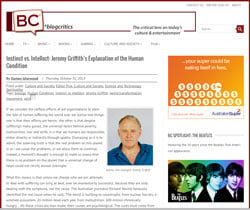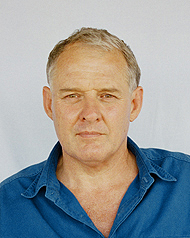Instinct vs. Intellect: Jeremy Griffith’s Explanation of the Human Condition

If we consider the selfless efforts of aid organisations to stem the tide of human suffering the world over we realise two things: one is that their efforts are heroic; the other is that despite suffering’s many guises, the universal factor behind poverty, malnutrition, war and strife, it is that we humans are responsible, either directly or indirectly through apathy. Dismaying as it is to admit, the sobering truth is that the real problem on this planet is us—we cause the problems, or we allow them to continue. Indeed, a moment’s thought is enough to make us aware that there is no problem on the planet that a universal change of heart could not rectify almost overnight.
What this means is that unless we change who we are, attempts to deal with suffering can only, at best, ever be momentarily successful, because they are only dealing with the symptoms, not the cause. The Australian journalist Richard Neville famously identified the real cause when he said, ‘The world is hurtling to catastrophe: from nuclear horrors, a wrecked ecosystem, 20 million dead each year from malnutrition, 600 million chronically hungry…All these crises are man made, their causes are psychological. The cures must come from this same source; which means the planet needs psychological maturity…fast. We are locked in a race between self destruction and self discovery’ (Good Weekend Magazine, Sydney Morning Herald, 14 Oct. 1986).

Psychological maturity has been long dreamt of, but until now has appeared so remote or quixotic that it was dispiriting to even consider. Developing and promoting an answer to this quandary has been the self-appointed task of Australian biologist Jeremy Griffith and the World Transformation Movement (WTM) for the last 30 years. The WTM is a not-for-profit organisation dedicated to serving humanity through disseminating a series of critically important, biologically-based ideas that explain human nature—why we are the way we are.
At the heart of the work of the WTM lies an extraordinary insight into our psychological immaturity by Griffith. The explanation that Griffith presents in his latest book FREEDOM: The End Of The Human Condition identifies as key the moment in our evolutionary history some two million years ago when humans’ emerging consciousness grew powerful enough to begin defying our pre-established instincts. Griffith says that as the conscious mind began experimenting with the power of free will, it inevitably—and tragically—drew criticism from our instinctive self, which was intolerant of any deviations from its instinctive expectations.
Griffith is not the first to identify the conflicting elements of intellect and instinct as somehow being responsible for our human condition. He himself writes, ‘the underlying protagonists involved in producing the upset state of our human condition of instinct and intellect have been recognised throughout human history in many mythologies, such as in the Garden of Eden story, and also by profound thinkers.’
Those profound thinkers include the primatologist Eugene Marais, the analytical psychologist Erich Neumann, the philosopher Arthur Koestler, the American neurologist Paul MacLean, the American psychologist Julian Jaynes, and even Plato with his metaphor of the charioteer trying to manage two horses representing passion and reason: ‘One of them is noble and of noble breed, and the other is ignoble and of ignoble breed.’
Where Griffith breaks new ground is in identifying what produces the conflict between instinct and intellect, and the exact results of that conflict. As Griffith points out, ‘What is significant is that none of the other accounts have recognised that the cause of the conflict between our instinct and intellect is that instincts are only orientations and that when the insightful nerve-based learning system became sufficiently able to understand cause and effect [and] to wrest management of self from the instincts the instinctive orientations would challenge that takeover, leaving the intellect no choice other than to defy that resistance, with that necessary defiance being the explanation for our angry, egocentric and alienated human-condition-afflicted state’.
The simplicity of the explanation is disconcerting, but does bring to mind Alan Savory’s dictum that ‘Whenever there has been a major insoluble problem for mankind, the answer, when finally found, has always been very simple’, and perhaps even Thomas Huxley’s comment in response to Darwin’s explanation of natural selection, ‘How extremely stupid of me not to have thought of that!’
If the simplicity is disconcerting, then it also needs to be said that the consequences of the explanation take time to digest. What is so healing about it is that having the full explanation of the human condition at last available enables us to appreciate that there was a very good reason for our angry, alienated and egocentric lives. It is an explanation for our condition that allows us to lift the so-called ‘burden of guilt’ from the human race, and paradoxically having defended it, also allows that angry, alienated and egocentric condition to subside. Psychological maturity for the human race, something we barely dared to dream of, at last becomes possible.
Professor Harry Prosen, a former President of the Canadian Psychiatric Association, bears witness to the extraordinary potential of this breakthrough, writing: ‘I have no doubt this biological explanation of the human condition is the holy grail of insight we have sought for the psychological rehabilitation of the human race’.




Please wait while the comments load...
Comments